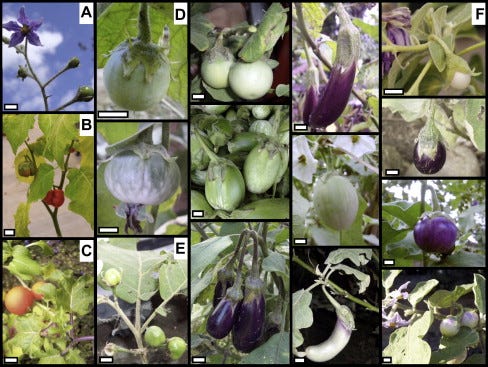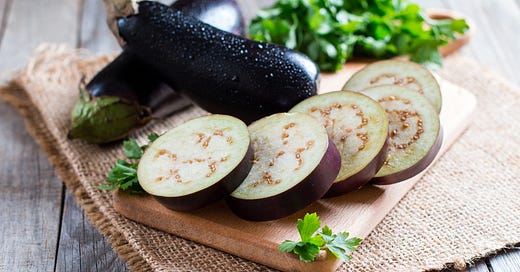Fall garden bounty: Eggplants!
Eggplants are a staple in any Italian household. But did you know that in addition to being a tasty food, eggplants also offer a number of health benefits?
Our home has been packed with high school teenagers and fifth graders from the neighborhood all weekend. Maybe it's our pet pig and two very lovable dogs, or perhaps the food I offer to each kid that runs through our house, but somehow, we've become a destination in our suburban neighborhood.
I'm writing this post on Sunday evening while the lasagna bubbles in the oven. In addition to our three kids who still live at home (one is away at college), we'll have two additional teens at our table tonight. On the menu (besides the lasagna), we have charred peppers (skin peeled and drizzled in olive oil) and grilled eggplants tossed in olive oil, garlic, and fresh herbs. I harvested the eggplant and peppers from our backyard garden this afternoon. Cooking like this, direct from the garden to the kitchen, brings me both a sense of satisfaction in our garden bounty as well as health benefits from a diet rich in culinary herbs and fresh vegetables.
The eggplant recipe is one I learned from my mother-in-law in Italy, and I'll share it below. But first, let me tell you a bit about the incredible health-promoting properties of this tasty garden vegetable, which is actually a berry (botanically speaking).
Botanical Origins
The eggplant, also known as aubergine (scientific name: Solanum melongena, Solanaceae) has been cultivated for centuries across the globe. The center of eggplant diversity is in Asia, and it was domesticated in southeast Asia over 4,000 years ago. An incredible 55 million tons of eggplant is produced each year, with the top producers being China, India, and Egypt.
Eggplants are an economically important food crop and there are many different cultivars consumed by people worldwide. The below image from a study on the genetic diversity of eggplant showcases the diversity of forms and colors of eggplant and its wild relatives.

Pharmacology
Among all the solanaceous vegetables (edible plants in the Solanaceae plant family)—others include tomatoes, peppers, and potatoes—eggplants are considered the best source of total phenolic acids. These phenolic acids are responsible for eggplants' excellent antioxidant properties and rapid fruit browning.
If you’ve ever heard the saying, “Eat the rainbow,” eggplant may pop out to you due to its vibrant dark purple skin. Dark reds, blues, and purples in our edible plants often indicate that they are rich in molecules known as anthocyanins. Anthocyanins are responsible for the deep hues in red cabbage, red onions, purple corn, purple eggplant, grape juice, black rice, blood oranges, cherries, pomegranates, and more.
While there are thousands of anthocyanin molecules, studies on this class of chemical compounds have noted that they act as powerful antioxidants and can reduce the risk of several chronic health conditions, such as heart disease, cancer, diabetes, and high blood pressure.
For example, a randomized, double-blind, placebo-controlled clinical study with 100 stressed participants investigated the effects of daily ingestion of eggplant powder on blood pressure, and psychological state noted a significant decrease in diastolic and systolic blood pressure in participants after 8 and 12 weeks of treatment, respectively.
Furthermore, a review paper on eggplant highlights its potential utility in managing metabolic syndrome, specifically concerning diabetes, high blood pressure, and hyperlipidemia (high cholesterol and lipids in the blood).
Recipe for grilled eggplant
Slice up three medium-sized eggplants into 1/4-inch slices.
Salt the eggplant on each side and leave in a colander over a bowl to drain the bitter liquid. Leave the eggplant to drain for at least 20 minutes, then wipe the salt off the surface of each side.
Chop up a handful of fresh herbs. I use whatever looks good in my garden. For example, parsley, mint, thyme, or oregano (or a blend of several fresh herbs).
Chop up 3 -4 cloves of garlic.
Mix the herbs and garlic into a bowl of olive oil. This oil mixture will be used to dip the eggplant before cooking and to drizzle on top after cooking.
Cook the eggplant on a grill or stovetop with a cast-iron grill pan. Cook until grill-marks are formed and then flip to cook the other side.
Remove from heat and plate. Drizzle with the oil and herb mixture. Serve warm directly or chilled. A loaf of sliced French or Italian bread is a wonderful accompaniment to this dish.
The Takeaway
Am I suggesting you eat eggplant every day? No! A diverse and well-balanced diet is essential to acquiring essential nutrients and phytochemicals necessary to maintain and promote health. However, if you’re looking for a great seasonal vegetable rich in anthocyanins and antioxidant properties to add to your plate, eggplant is a great choice!
Yours in health, Dr. Quave
Cassandra L. Quave, Ph.D. is a scientist, author, speaker, podcast host, wife, mother, explorer, and professor at Emory University School of Medicine. She teaches college courses and leads a group of research scientists studying medicinal plants to find new life-saving drugs from nature. She hosts the Foodie Pharmacology podcast and writes the Nature’s Pharmacy newsletter to share the science behind natural medicines. To support her effort, consider a paid or founding subscription, with founding members receiving an autographed 1st edition hardcover copy of her book, The Plant Hunter.
Available in hardcover, paperback, audio, and e-book formats!








Oh my goodness, I love eggplant! Had some tonight in at a Thai restaurant (yes still eating outside tablets, thank you). Once I started to follow some of the rabbit holes about eggplant being in the nightshade family (right?), but I don't think there's any actual concern there. Nightshade sounds scary and poisonous, but with all the benefits you listed above, and the taste, how could I ever give them up? Why would we want to?